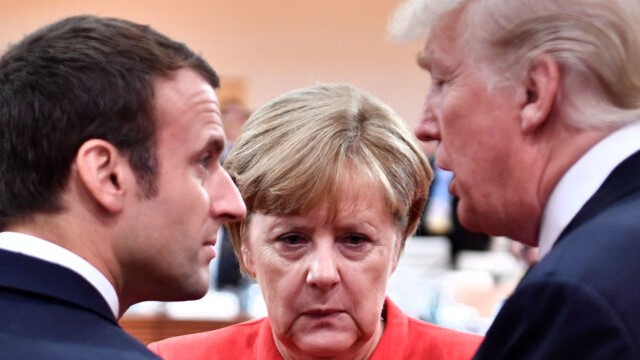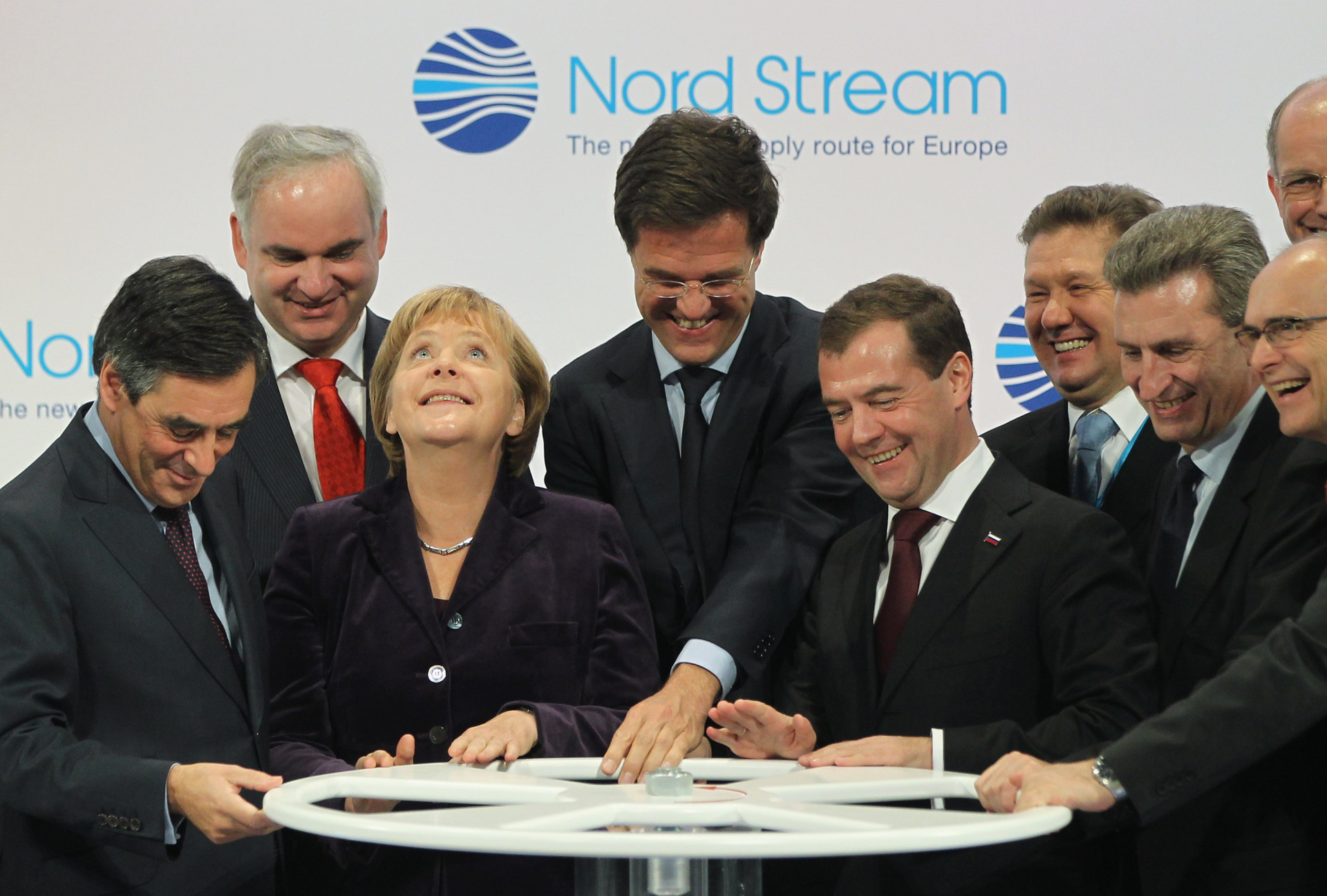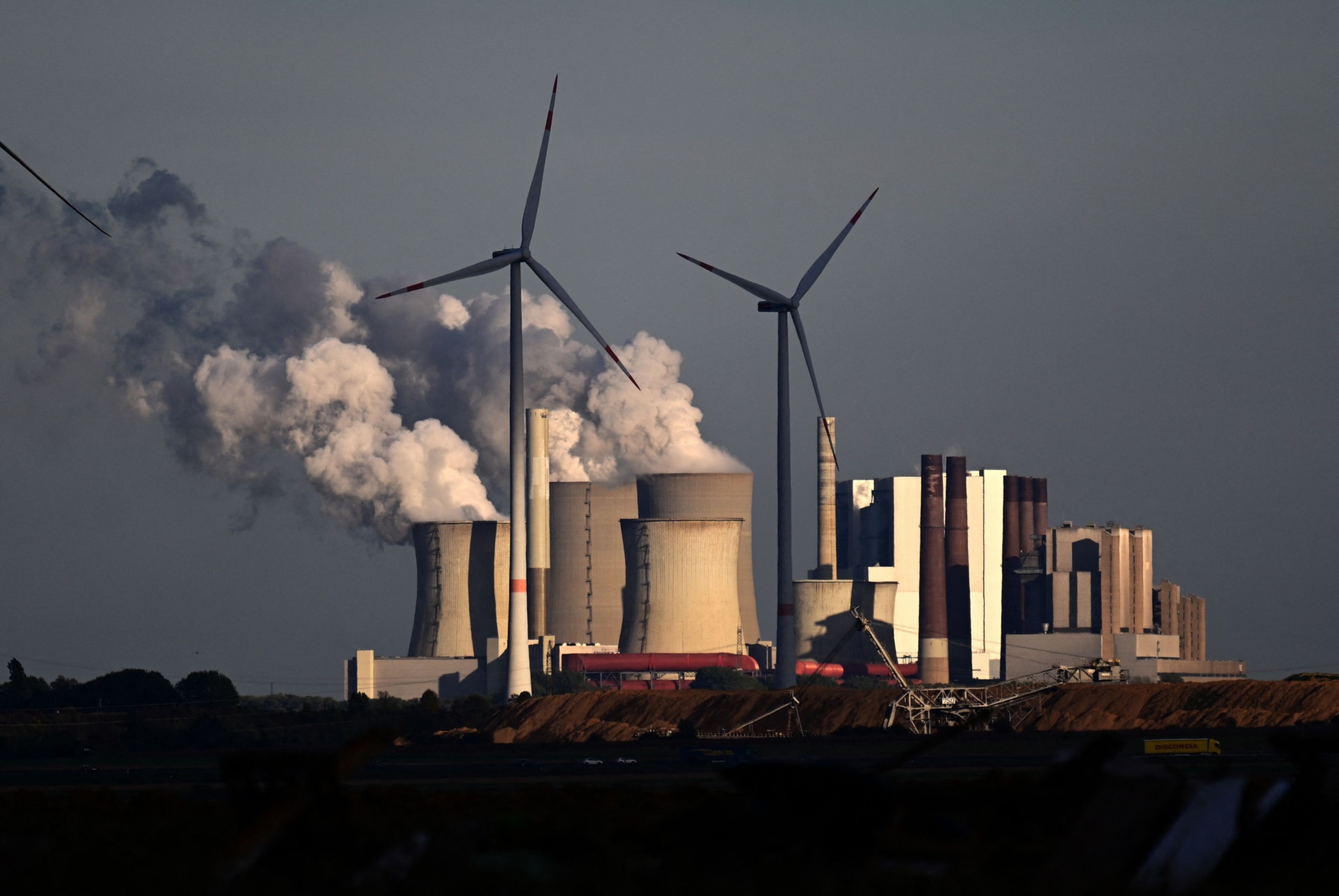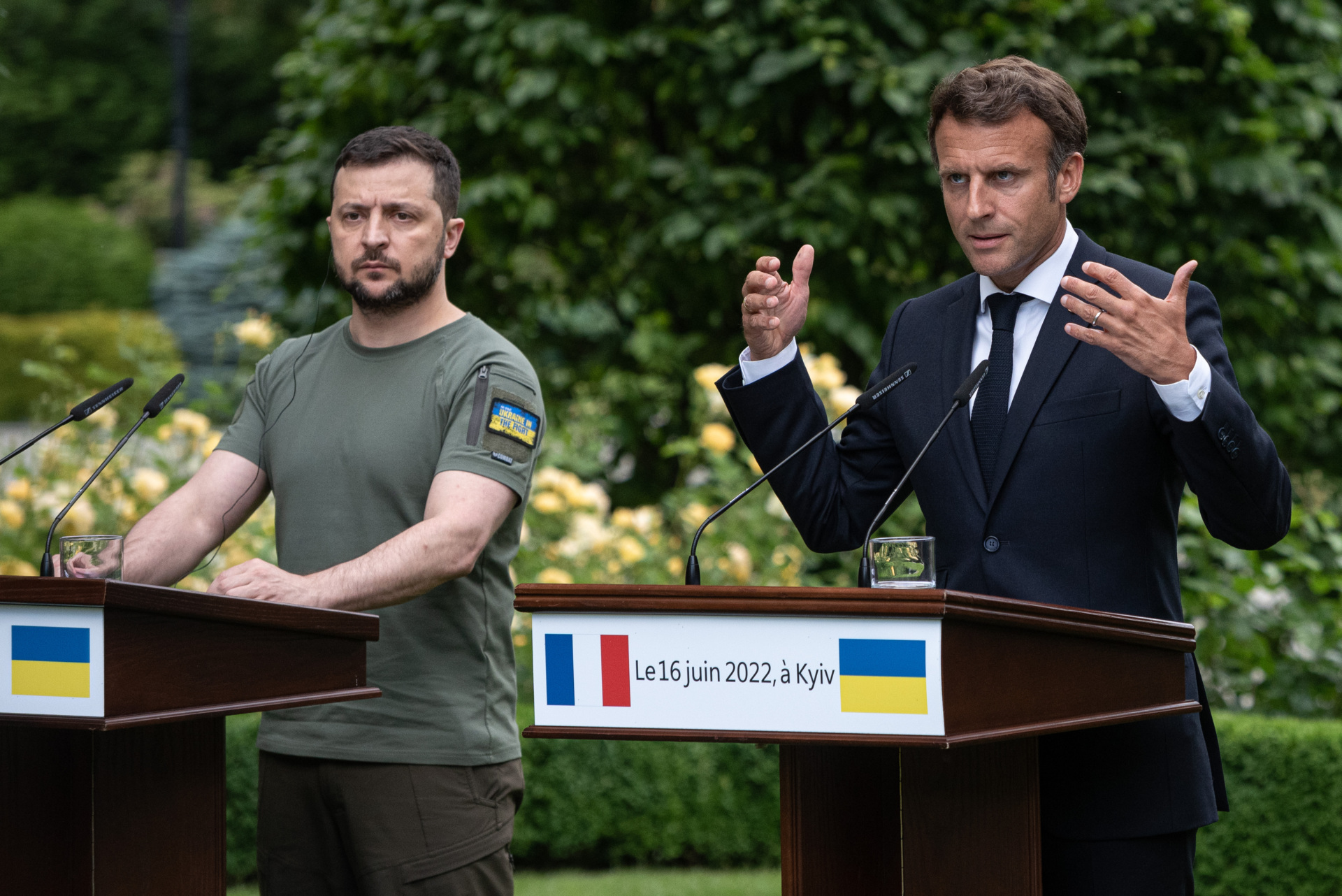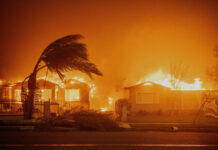This year, former President Donald Trump was proven right in his critiques of the globalist green agenda of the European Union and its reliance on Russian energy, which following the war in Ukraine have both been exposed as devastating failures of leadership.
In 2018, then-President Donald Trump took to the lectern of the United Nations in New York City to denounce what he saw as a foolhardy and dangerous move by Germany to increase its reliance on Russian natural gas.
“Germany will become totally dependent on Russian energy if it does not immediately change course,” Mr Trump warned.
In the wake of the speech, the establishment media reacted with self-satisfied glee as the German delegation was filmed openly laughing at the Cassandra-like warnings of the American leader.
Just four years later, Trump’s warnings have proven prophetic, with the German and indeed the entire European Union economy falling into an energy crisis as the gas from Moscow dried up in response to sanctions over the invasion of Ukraine, with the billions spent on windmills and solar panels proving insufficient to meet the needs of the 450 million citizens of the bloc.
Nord Stream: A Pipedream
“The former Chancellor of Germany is the head of the pipeline company that’s supplying the gas… Germany is totally controlled by Russia.” — Donald Trump, 2018.
French Prime Minister Francois Fillon, German Chancellor Angela Merkel, Dutch Prime Minister Mark Rutte, Russian President Dmitry Medvedev, and European Union Energy Commissioner Guenther Oettinger turn a wheel to symbolically start the flow of gas through the Nord Stream Baltic Sea gas pipeline at a ceremony on November 8th, 2011, in Lubmin, Germany. (Photo by Sean Gallup/Getty Images)
A defining feature of globalist thinking in the nineties and the noughties was the belief that increased trade and access to the free markets of the West would see authoritarian regimes naturally become democratised, and that greed in and of itself would be enough to give cultures with little history of liberalism a desire for freedom.
To date, this has not come to fruition in Vladimir Putin’s Russia after Germany and other EU member-states opened up the floodgates to oil and gas from Moscow under the pretext that Russia would abandon its tendency towards aggression for fear of losing out on EU cash for its chief export — or indeed in Communist China after it was permitted by the United States to join the World Trade Organization (WTO).
Europe’s dependency on Russian gas was vastly expanded in 2011 when the Nord Stream 1 pipeline was connected to Germany under the leadership of then-chancellor Angela Merkel. At the opening ceremony, Merkel said that the opening of the pipeline would usher in a “safe, sustainable partnership with Russia in the future,” claiming that Russia would be a major supplier of gas to Europe for decades to come.
“The purchasing countries and Russia are profiting in equal measure,” she added.
During the same year, the Merkel administration made the rash decision to spurn nuclear energy and begin decommissioning its robust nuclear power sector following the Fukushima disaster in Japan in 2011. It is unclear why the government made this decision, however, given that Germany does not sit on any major fault lines or experience tsunamis, as was the case in Fukushima.
‘Putin’s Useful Idiots’ – Ukrainian State Media Slams German Political Classhttps://t.co/SIS4ZWBmeU
— Breitbart London (@BreitbartLondon) April 1, 2022
The motives for building the Nord Stream pipeline were questionable from the start, with the project initially being signed off on in 2005 by Vladimir Putin and then-chancellor Gerhard Schröder of the Social Democratic Party (SPD), who subsequently joined the boards of Nord Stream AG — the company that built the pipeline — as well as other Russian energy giants such as Gazprom shortly after he left office.
The appearance of corruption was frequently highlighted by President Trump, who said of Schröder in 2018: “The former Chancellor of Germany is the head of the pipeline company that’s supplying the gas… Germany is totally controlled by Russia.”
“It is very sad when Germany makes a massive oil and gas deal with Russia, where we’re supposed to be guarding against Russia, and Germany goes and pays out billions and billions of dollars a year to Russia. We’re protecting Germany, we’re protecting France, we’re protecting all of these countries,” the American leader added, referencing his country’s substantial NATO commitments.
The approval of the Nord Stream 2 pipeline from Russia is outgoing German Chancellor Angela Merkel’s “biggest mistake”, the former president of the EU Council said in comments backing up warnings from former President Donald Trump. https://t.co/MtjINbgPL8
— Breitbart News (@BreitbartNews) November 30, 2021
Germany continued to expand its relationship with Russia, with Merkel signing off in 2018 on a second gas pipeline, Nord Stream 2.
In a stunning example of lack of foresight, a declassified document dated four months before the February invasion of Ukraine revealed that Merkel’s administration — in which current chancellor Olaf Scholz served as finance minister — believed that increasing dependency on Russian gas through Nord Stream 2 gas pipeline would “not jeopardise” Germany’s energy security.
While the Trump administration attempted to prevent the Nord Stream 2 pipeline from opening through the imposition of sanctions, with Trump arguing that it would leave Europe “captive” to Russia, Merkel would later come to a deal with President Joe Biden to allow it to open.
Though current chancellor Olaf Scholz ultimately suspended the opening in February — days before the launch of the latest invasion of Ukraine by Russia — questions remain as to why he had supported expanding energy reliance on Russia in the first place.
In the months following the invasion, Russia continuously reduced its flow of gas to Germany and other EU members.
The flow of gas was ultimately completely shut down from the Nord Stream 1 pipeline by Putin in August over alleged maintenance issues. Just weeks later, both Nord Stream 1 and 2 would suffer underwater leaks that have kept them offline to the present day. International inspectors, led by Sweden, have claimed that the leaks were a result of deliberate sabotage, but a culprit has yet to be identified, with both Russia and the West pointing their fingers at each other.
Blowing in the Wind
“Darling, is the wind blowing today? I’d like to watch television, darling.” — Donald Trump, 2019.
Picture taken on October 5th, 2022 shows wind turbines in front of the lignite-fired Niederaussem power plant operated by German energy giant RWE near Niederaussem, western Germany. (Photo by INA FASSBENDER/AFP via Getty Images)
The transition to supposedly green energy sources has long been promised as a new engine of economic growth, however, despite what should have been a banner year for the industry in Europe in light of the decreased flows of natural gas from Russia, many leading wind firms in the bloc have reported heavy losses and investment seems to be drying up. xc
Last month, the Madrid-based Siemens Gamesa Renewable Energy, one of Europe’s largest producers of offshore wind turbines, reported an annual loss of some 940 million euros ($965 million). It is expected to cut 2,900 jobs, or about one-tenth of its total workforce.
Meanwhile, Denmark’s Vestas Wind Systems — the largest turbine producer in the world — reported that it had lost 147 million euros ($151 million) in the third quarter alone.
Denmark PM Says Answer to Defeat Putin Is to go MORE Greenhttps://t.co/pgIkwNTAkh
— Breitbart London (@BreitbartLondon) April 21, 2022
This has coincided with decreased investment into the sector. This month, the Federal Network Agency in Germany revealed that few companies were willing to invest in new wind projects. According to the energy regulator, the government had hoped to offer tenders to private companies for the construction of new wind farms to generate 1,190 megawatts (MW) of power. This was later downgraded to 604 MW, however, so far only 203 MW have been greenlit.
Solar projects are also failing to generate interest, with the government only able to ink a little over half of its desired projects for new panels on buildings.
The problems for the industry have come in large part as a result of continued supply chain issues, which started during the Chinese coronavirus lockdowns. Many of the raw materials required for the production of wind turbines, such as the rare earth minerals used to make high-strength magnets, are imported into Europe from mines in Africa and China, often extracted in incredibly poor conditions that lead to environmental degradation and adverse health impacts on the local populations.
A recent study from the German Institute for Economic Research (DIW) found that the European Union is wholly reliant on foreign imports for 14 “critical” raw materials used in industrial production.
‘End of Abundance’ — President Macron Warns of Public Unrest in France as Energy Crisis Biteshttps://t.co/zqCmxPBBLQ
— Breitbart London (@BreitbartLondon) August 24, 2022
The issues facing the industry are not only related to supply chain issues, however, as China has ramped up production of its own wind turbine industry — a blow given that many European firms cannot compete on cost of labour or materials with the communist dictatorship.
The Chinese already dominate the solar power sector, with nearly all solar panels in Europe originating in China. The industry is mainly centred in the Xinjiang region, where up to three million Uyghurs, Kazakhs, Kyrgyz, and other ethnic minorities have reportedly been imprisoned in concentration camps, and allegedly used for slave labour to produce the solar panels.
The heads of Germany’s intelligence community warned in October that the Social Democrat-led coalition government of Chancellor Olaf Scholz was being “naive” in falling into the same trap of over-reliance on China as it did with Russian gas.
President Trump mocks the Green New Deal at @CPAC: “Darling, is the wind blowing today? I'd like to watch television, Darling.” pic.twitter.com/VrAqBJg2Hh
— Kyle Morris (@RealKyleMorris) March 2, 2019
Though Germany massively ramped up renewable energy production this year, it still only accounted for around half of its overall demand.
Following the slowdown of Russian gas shipments, the country was left to scramble to fill its reserve tanks from shipments from the world market, which ironically came in large part from Chinese tankers that had previously bought Russian gas, thereby not only enriching the CCP but also indirectly enriching the Kremlin’s war coffers.
The economic powerhouse of the European Union had few options, however, given that during the time at which electricity is most needed, during the depths of winter, wind energy typically falls due to intermittency issues — in other words, the wind is often not blowing.
Hot Air
“Putin is saying, ‘Okay, I can take over a whole country and they’re going to just sanction me?’ … The problem is not that Putin is smart. The real problem is that our leaders are dumb.” Donald Trump, 2022.
Ukraine’s President Volodymyr Zelensky and France’s President Emmanuel Macron are seen during a press conference on June 16th, 2022 in Kyiv, Ukraine. (Photo by Alexey Furman/Getty Images)
To date, the European Union has imposed sanctions on 1,386 individuals and 171 entities in Russia in response to the invasion of Ukraine and the illegal annexation of Crimea in 2014. This has included top political figures such as President Vladimir Putin and Foreign Affairs Minister Sergey Lavrov. The EU has also targeted Russian financial institutions, media organisations, and, earlier this month, the bloc imposed a ban on seaborne oil from Russia, as well as joining onto the U.S.-led effort to impose a global cap on Russian crude oil at $60 (£48) per barrel.
This will likely see many European nations scramble to make up for the loss in Russian oil, with oil-rich nations such as Saudi Arabia, the United Arab Emirates (UAE), and Venezuela so far refusing to ramp up production.
Ironically, the move could also see EU countries forced to turn back to the use of coal en masse — something which has already begun, with coal-fired power plants being reopened in August. The government’s Green Party economy and climate minister Robert Habeck said at the time that it was a “bitter” but a necessary evil.
Germany’s leftist climate goals as a whole took a backseat this year, with a study finding that the nation pumped 164 million tonnes of extra carbon dioxide into the atmosphere because of the increased use of coal. The International Energy Agency (IEA) said in its annual report that this year global coal use climbed to over 8 billion tonnes for the first time in history, in large part as a result of the energy crisis.
The need to return to the relatively dirtier form of energy as a result of decreased gas flows from Russia makes decisions to ban domestic fracking in Europe all the more disastrous.
The practice was banned in France in 2011, Denmark in 2012, the Netherlands in 2015, and Germany in 2017. In contrast, fracking was greatly expanded in the United States under former President Donald Trump, boosting energy independence and also helping to drive down emissions in the United States to their lowest levels in over three decades.
Italy’s Prime Minister Mario Draghi has drawn ridicule for saying that people can either choose peace in Ukraine or their air conditioners. https://t.co/gJel26biFw
— Breitbart News (@BreitbartNews) April 9, 2022
The war in Ukraine has not only exposed the EU’s green agenda as a foolish endeavour, but has also shown up the “hypocrisy” of the frequent and flowery statements on the importance of Ukrainian freedom and democracy from the mouths of European leaders.
In December, Breitbart London reported that imports of Liquified Natural Gas (LNG) from Russia actually increased by 21 per cent to the EU and UK compared to before the February invasion. This meant that the EU and UK paid Moscow nearly 27 billion euros ($28.4/£23.5 billion) for LNG.
In comparison, the Kiel Institute for the World Economy Ukraine aid tracker found that during the same period the EU sent approximately 29 billion euros in military and financial assistance to Ukraine, meaning that the bloc had essentially been funding both sides of the war equally.
Commenting on the Breitbart London report, the former Director of the National Economic Council in the Trump administration, Larry Kudlow, said: “Does that make any sense? Of course not, it actually smacks of rank hypocrisy.”
While the European Union has begun to pay for their failures to heed the warnings from Trump on their over-reliance on Russian energy and their pursuit of the green agenda, it was perhaps their failure to understand the central theme of the Trump administration, ‘America First’, that truly foretold their downfall.
Rather than taking the advice to serve the interests of their own citizens above all else, European leaders embarked on a grand globalist vision to save the earth from the supposed Armageddon that is climate change. Yet this lofty project has only left their citizens poorer and the future of their countries more unstable.
Appearing at the United Nations in 2017, Mr Trump told world leaders: “As the President of the United States, I will always put America First. Just like you, as the leaders of your countries, will always and should always put your countries first.
“All responsible leaders have an obligation to serve their own citizens and the nation-state remains the best vehicle for elevating the human condition.”
The European Union has seen imports of liquid natural gas from Russia rise to record levels this year, sending billions to Moscow while waxing poetic about their support of Ukraine.https://t.co/h1oSoZlcYI
— Breitbart London (@BreitbartLondon) December 6, 2022

